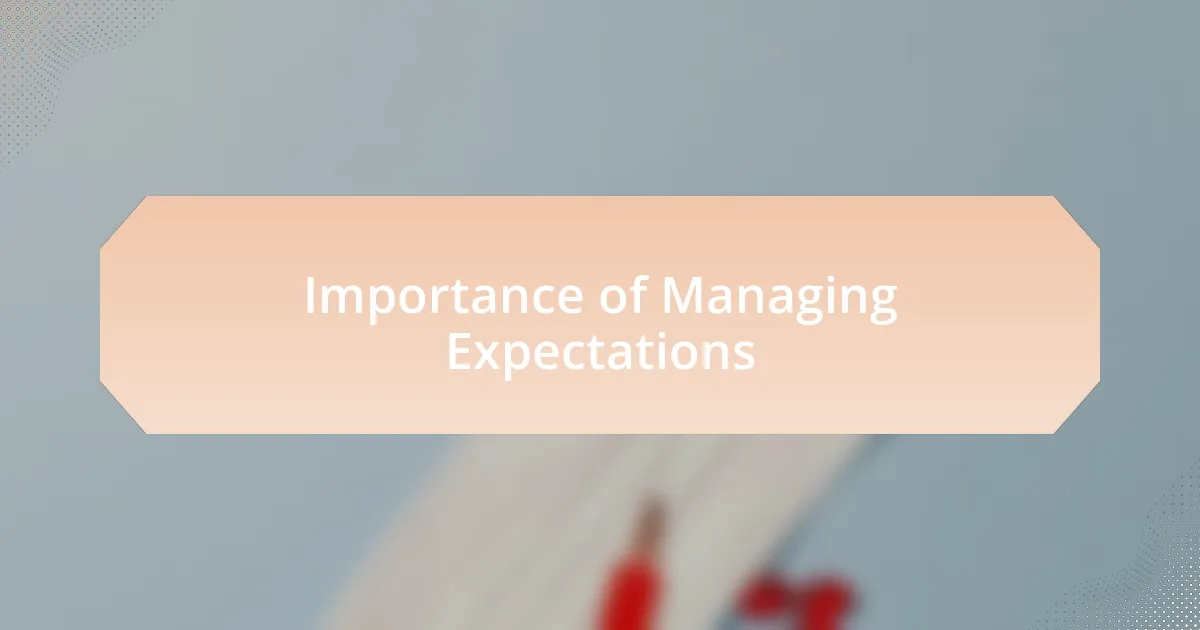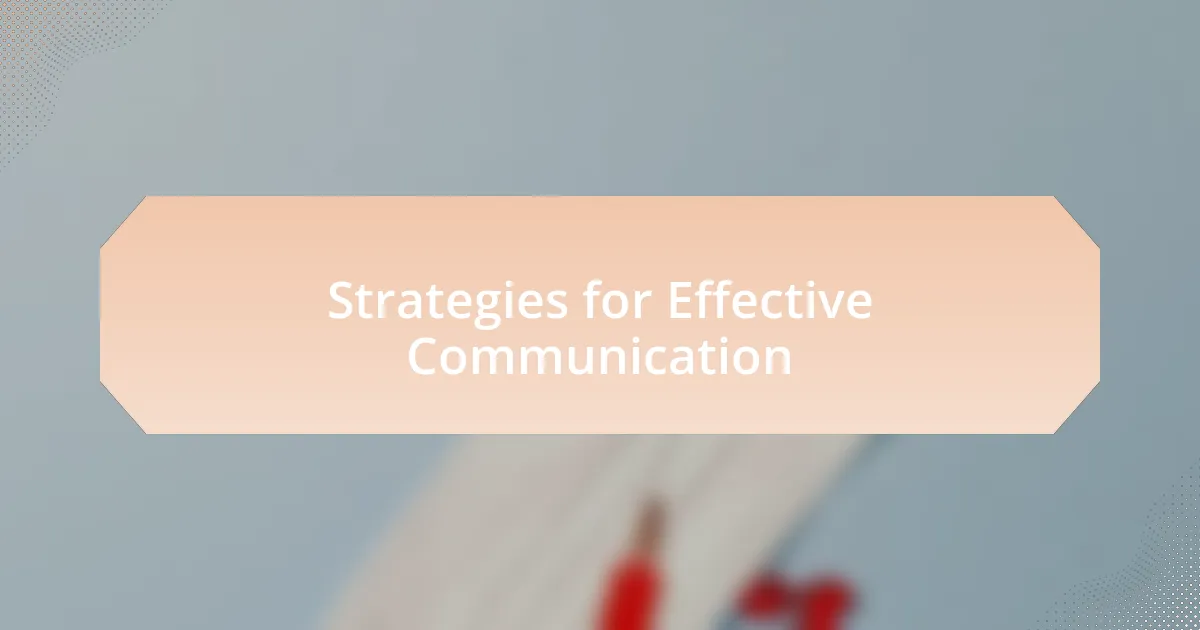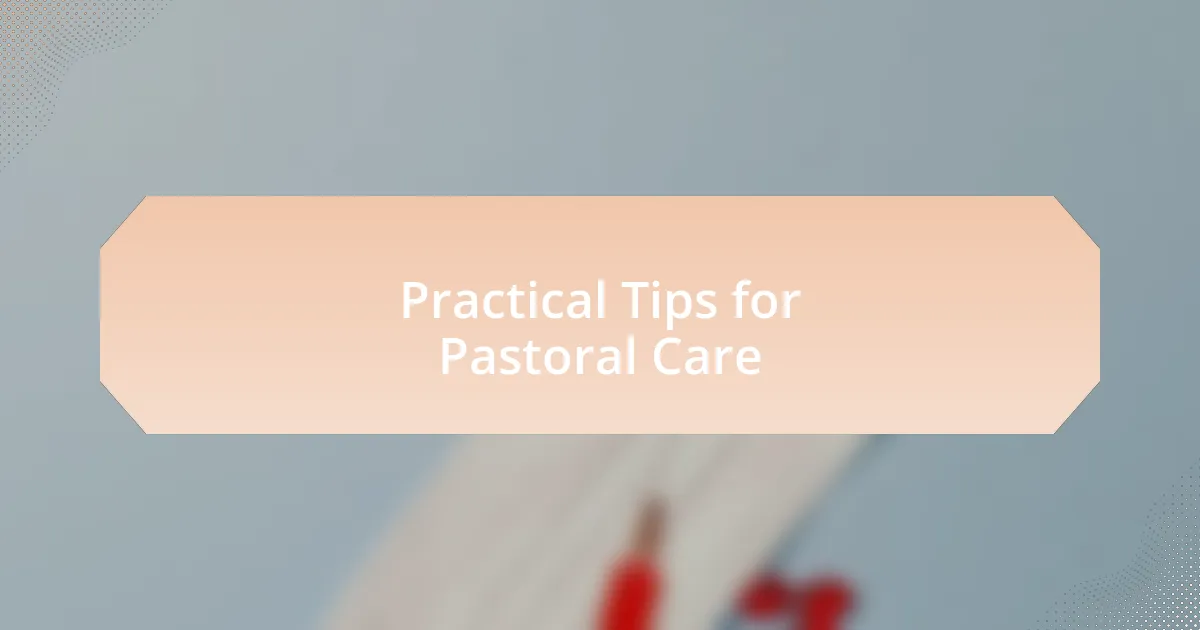Key takeaways:
- Hospital ministry emphasizes empathy, active listening, and being present to support patients and families through challenging times.
- Managing expectations is crucial for building trust and fostering genuine healing, focusing on presence over quick solutions.
- Effective communication strategies include active listening, transparency about uncertainties, and leveraging non-verbal cues to convey support.
- Personal experiences and self-awareness enhance the ability to manage expectations and provide tailored support for individual situations.

Understanding Hospital Ministry
Hospital ministry is a unique blend of faith and healing, where the pastor becomes a bridge between hope and emotional distress. I still remember my first visit to a patient who was grappling with terminal illness; their fear was palpable. How do you find the right words in such moments? It’s a delicate balance of empathy and spiritual support.
At the heart of hospital ministry is a profound understanding of human vulnerability. Each patient’s story is different, but the common thread is the quest for comfort in the face of uncertainty. I often reflect on how important it is to listen actively; sometimes, just being there, holding someone’s hand, can communicate more than words ever could.
The challenges in hospital ministry are significant, yet they invite deep connection and growth. Engaging with families during difficult times forces me to confront my own feelings about loss and grief. Have you ever sat with someone who was processing the unthinkable? Those moments change you, shaping not only your ministry but also your very approach to life itself.

Importance of Managing Expectations
Managing expectations within hospital ministry is crucial for fostering trust and understanding. I recall a time when a family eagerly awaited a miracle after surgery, and I had to gently guide them towards accepting the reality of their situation. It reminded me that setting realistic expectations can help avoid crushing disappointments during those vulnerable moments.
It’s not just about what I can offer as a pastor; it’s about aligning my support with what patients and families truly need. I once sat with a widow who hoped for speedy closure after her husband’s passing, and I realized my role was more about walking with her through the grief process than providing any definitive answers. How often do we overlook the importance of being present over a quick fix?
When expectations are well managed, it creates a space for genuine healing. I remember a patient whose recovery journey was slow and painful. By openly discussing the ups and downs, we cultivated a sense of patience and resilience together. This collaboration not only strengthened our bond but also illuminated the beauty in the process itself, reminding me that healing often takes time and understanding.

Key Challenges in Hospital Ministry
Navigating the complexities of hospital ministry often brings unique challenges, particularly when dealing with grief and loss. There was a moment when I stood with a family who had just received heartbreaking news about their loved one. The looks on their faces were a mixture of shock and despair, and I found myself grappling with how to provide comfort that felt genuine and timely. How do we truly support someone when words seem so inadequate in the face of such profound sorrow?
Another challenge I frequently encounter is balancing the emotional needs of patients with the limitations of medical realities. I once attended to a patient whose optimism clashed starkly with the doctor’s prognosis. It felt like walking a tightrope—how do I nurture hope while gently pointing towards the truth? This delicate balance is something I continually strive to navigate in a way that respects both faith and facts.
Then there’s the expectation of always having the right answers. I remember a time when a patient anxiously sought insight into their treatment options, and all I could offer was my presence and an open ear. In moments like these, I often reflect: isn’t it more important to simply listen and validate their fears rather than trying to fill the silence with empty reassurances? Engaging with patients and their families on a deeper emotional level often reveals the true essence of ministry—one of comfort, understanding, and unwavering support.

Strategies for Effective Communication
Effective communication in hospital ministry hinges on active listening. I recall a moment when a patient, visibly distressed, poured out her fears about her diagnosis. Rather than jumping in with reassurance, I simply nodded and mirrored her emotions. This validation can often be more powerful than words; it shows the person that their feelings are not only heard but acknowledged.
Another strategy I find invaluable is being transparent about uncertainties. When I address questions about treatment, I often share my own uncertainty while making it clear that I’m here to walk alongside them. This honesty builds trust and fosters an environment where difficult conversations can occur. After all, how often do we find ourselves feeling more secure when we know we’re not alone in our uncertainties?
Lastly, leveraging non-verbal cues can profoundly enhance my ability to communicate effectively. I recall visiting a young boy who couldn’t speak due to his illness. Through simple gestures and a soft touch, I could convey empathy and care. This experience made me realize that often, our body language and presence can offer comfort that words simply cannot. Isn’t it fascinating how sometimes silence can speak volumes?

Personal Experiences in Expectation Management
Managing expectations as a pastor requires self-awareness and understanding. I remember a time when a parishioner approached me with lofty expectations about his upcoming surgery. I took a moment to share my own experiences of waiting for medical results, highlighting the unpredictability that often accompanies such situations. By bridging our experiences, I found that we not only managed his expectations but also deepened our connection.
Sometimes, clear boundaries around what I can provide also play a crucial role in managing expectations. There was a period when a family expected constant updates about their loved one in the hospital. I sat down with them to explain my limitations and the processes involved in patient care. They appreciated the honesty, and it became a turning point in our relationship, allowing them to feel more at ease.
In other instances, I’ve learned that acknowledging the emotional weight of expectations can foster healing. I recall a day when a young mother expressed frustration over her child’s slow recovery. Instead of providing empty platitudes, I validated her feelings and reminded her that healing is a journey. This conversation not only reassured her but also illuminated the importance of patience and grace in both our lives.

Practical Tips for Pastoral Care
One of the most effective practical tips for pastoral care is to actively listen before responding. I vividly recall visiting a family who had just experienced a loss. They weren’t looking for solutions; they needed someone to hear their pain. By just sitting with them in silence, I could feel the tension lift as they began to process their grief. Isn’t it often true that sometimes, just being present speaks louder than words?
Another key aspect is to tailor your approach to each individual’s unique situation. When interacting with a new parishioner facing a difficult family crisis, I opted for a more hands-on method of support. I offered to accompany them to a support group. It turned out to be a turning point, not just for them but also for me, reinforcing the idea that pastoral care isn’t a one-size-fits-all endeavor.
Don’t underestimate the power of follow-up. I remember checking in with a congregant after a hospital stay, where I found they had been feeling isolated. By arranging a simple coffee meet-up, our conversation turned into an uplifting exchange rather than a clinical visit. Reflecting on this, I often ask myself: how can small gestures foster deeper connections within our community? It’s in these moments that I truly see the impact of genuine pastoral care.